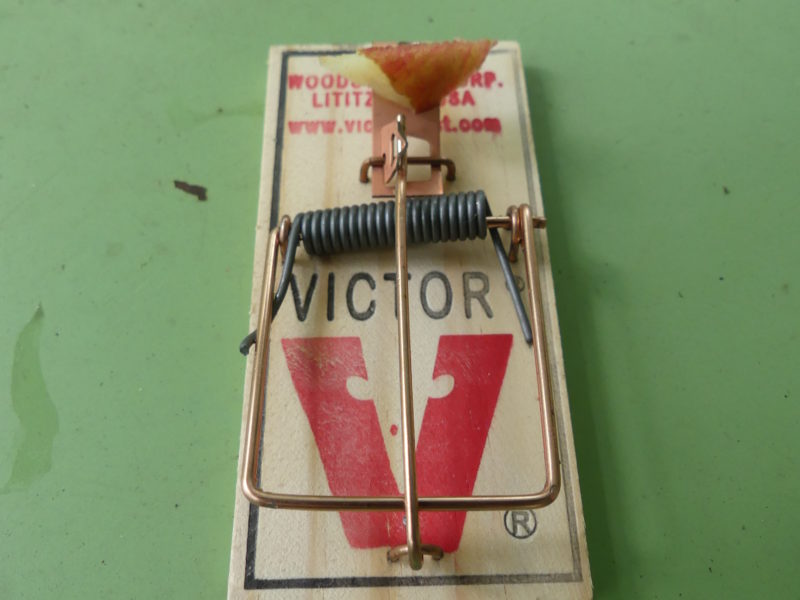

At the exact moment that your favorite tomato, melon or strawberry reaches the point of absolutely perfect, wonderfully delicious peak flavor, there’s a critter lurking that wants to have a bite, or 10, before you do. Early farmers and home growers learned that a scarecrow worked to deter some of these marauders, but these critters learn fast and a static scarecrow has very limited success.
Knowing who’s lurking and how to deter them is your best defense. Poisons are not the answer. Cunning and being smart is. You need an arsenal in this fight, and this arsenal begins with knowing who the marauders are, what they’re after and how to deter them. Forget getting rid of them. Better to simply convince them to go elsewhere.
What follows is an alphabetical review of these critters, what they love and the ways you can fight back. If you have additional suggestions you’d like to share, please let me know as every few years I update this information. It’s especially important with all the new gardeners who’ve decided to get their hands dirty and strive for the ultimate harvest.
Birds, more specifically crows and blue jays, will go after a number of crops from apples to blueberries and tomatoes. If you’re growing a good number of blueberry or raspberry bushes, a berry cage, berry house or netting will be your deterrent of choice.
Chipmunks, cute as they are, will rob every cherry tomato they can get their hands, on and they love gooseberries and strawberries. A cat is your best defense here but not just any cat — you need a mouser. You can also trap and relocate chipmunks with a Havahart live trap, but the relocation must be at least a quarter mile away.
Deer go bonkers for apples. They’ll eat every one that drops, but they prefer to simply pull the ripe ones off the trees. If you’ve got a small number of trees you can fence them individually with 8-foot-tall fencing like C-flex. Flash tape works to some degree, but deer have limited vision and the flash tape needs to be rustled by the wind to be effective. And if you’ve got deer issues, never ever pick up a dropped apple and eat it or use it in cider as it may come into contact with deer droppings, which can cause you serious intestinal issues.
Deer will also feed on tulip flowers and tulip bulbs when planted. Taste repellents can work here and newly planted bulbs should be treated with Bobbex-R prior to planting. This will also give protection against squirrels going after newly planted tulip and lily bulbs.
Mice are rarely a problem, but once the chipmunks get to work on the tomatoes the mice will come in and take sloppy seconds. You can trap mice in live traps but relocation is nearly pointless if you’ve got a crew of them. Old-fashioned mousetraps are the best control, baited with small apple pieces or peanut butter.
Moles are insectivores and do not eat vegetables or fruits. See voles though.
Opossums, or just possums, are rarely a problem, but they are around and can look intimidating. They are omnivores and will eat slugs and snails, small rodents and damaged or dropped vegetables. When they sense danger they curl up in a ball and play — you got it — possum. Teach your kids that these are the only North American marsupial, which carry their young in their pouch.
Rabbits can and will continue to be a challenge. More often than not they have a den either in your garden or nearby. I was amazed when I found my first rabbit den and how tiny the opening was. Keep wood piles and debris away from the garden as that’s a prime hiding spot as well as dense, nearby vegetation. Use rabbit fencing around your garden. It’s the best protection. I’ve had some good results using the repellent Rabbit Scram. It needs to be used as a perimeter application around a bed, a garden or a small property.
Chicken wire will also deter rabbits, but it needs to be 3 feet tall. Make ground contact and use sod staples to ensure that the rabbits don’t push under it. Better yet is rabbit fencing that has a grid design where the spaces on the bottom are small and get larger as the fence gets higher. Again though, the fence needs good ground contact. Fourty-inch-tall rabbit fencing will cost under a dollar a foot and if galvanized it should last five years or more.
Raccoons are difficult to manage simply because of their size. They will rip ears of corn off your stalks and eat them elsewhere. They are also fond of strawberries and melons including pumpkins when they are ripe. If they can’t get under a fence they’ll get over it — but not if it’s an electric fence. There are small garden electric fence kits that will do the job, and they run on D-cell batteries. Once a raccoon makes contact with the fence it learns quickly to keep away. Raccoons can also climb fruit trees, but this is rare. Trapped raccoons cannot be legally relocated and must be euthanized.
Squirrels begin early in the season. If it’s a dry spring they go for green apples for both moisture and nutrients. As the season goes on they’ll also go after other fruits and veggies, especially corn. They can be trapped and relocated and may be deterred by some of the scent repellents — but never apply repellents directly to fruits or veggies. A product called Tanglefoot can be applied to the trunks of fruit trees and acts as an effective deterrent when properly applied.
Shrews are small and rarely seen in the garden though you may catch one in a trap. I’ve been working in the garden when one will completely ignore me and walk through my legs. They are smaller than mice and voles and have somewhat pointed snouts. They eat snails, seedlings, seeds, nuts, beetles, worms and slugs as well as mice. They don’t generally eat fruits or vegetables and are considered to be beneficial in the garden.
Skunks are omnivores also. If you do encounter one, walk away and don’t annoy it. Skunks do little damage. I once caught one by accident and was surprised how docile it was but don’t assume yours will be. If you catch one in a trap, cover the trap with a towel and come back at night when you can move the trap or release the skunk.
Voles are larger than shrews and mice. Their fur is darker than mice and their ears are not as noticeable. Their tails are shorter than mice and hairy. Voles cause great economic losses in apple orchards where they gnaw at the bark on the trees and feed on dropped fruit. They’ll also feed on and devour perennial roots and crowns. Voles reproduce year-round so they are always in search of food. They don’t tunnel but will use mole tunnels. They tend to burrow through turf leaving a visible path, not a tunnel, under leaves and wood piles.
Voles can be trapped with mousetraps using small pieces of apple, but gardeners must be patient and persistent. Traps should be placed where you find runs, and you can also place them near the entrance to their dens, which appear as random holes in the ground.
Woodchucks or groundhogs are only an issue for those west of the Shinnecock Canal. The canal has, so far, been a successful barrier to their eastward movement with known populations in Hampton Bays, Westhampton, Manorville and Riverhead. They can be trapped in simple box traps baited with apple, but once trapped, what do you do with them? It’s illegal to transport them, and exterminators and required to euthanize them when trapped.
Woodchucks are primarily foragers and will browse on grasses, perennials and other vegetation. The best protection might be not giving them places to live like under sheds and porches. They have no predators out here other than automobiles.
Yellow jackets can be a problem wherever fruits are ripe and left on the tree or left on the ground. There is no way to avoid their late summer and fall visits, but keeping your ripe fruits picked and off the ground will help immensely. They also tend to follow bird damage as once the birds break the skins of fruits like apples and pears these wasps follow quickly.
These critters are all just another facet of gardening but it shouldn’t be a big issue if you keep the ground clear of dropped fruits and vegetables, harvest on time and use repellents and deterrents as needed. Remember also that electric fences can work against the larger marauders. I just got tired of getting shocked regularly. Keep growing.
 More Posts from Andrew Messinger
More Posts from Andrew Messinger